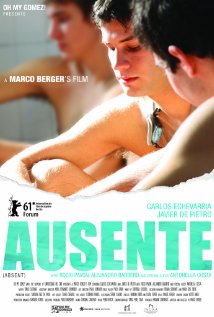Absent (2011 film)
| Ausente (Absent) | |
|---|---|
 Theatrical release poster | |
| Directed by | Marco Berger |
| Written by | Marco Berger |
| Produced by | Marco Berger, Mariana Contreras & Pablo Ingercher Casas (executive producers) |
| Starring | Carlos Echevarría Javier De Pietro |
| Cinematography | Tomas Perez Silva |
| Edited by | Marco Berger |
| Music by | Pedro Irusta |
Release dates |
|
Running time | 90 minutes |
| Country | Argentina |
| Language | Spanish |
Ausente (English translation and title Absent) is a 2011 Spanish-language drama film directed by Argentine director Marco Berger. The film tackles the notion of sexual abuse of students, but director Marco Berger flips the dynamic. In this film, a young man wants to lure his teacher into a sexual relationship, rather than the other way round (i.e. where an older individual in a position of authority or trust becomes infatuated with a minor and lures the minor into a sexual relationship).
Synopsis
The story is told by Sebastián (Carlos Echevarría), the sports coach who becomes the object of a student's affection. Martin (Javier De Pietro) is a 16-year-old young student who is attracted to his coach, Sebastián. Sebastián tries to keep Martin at a distance, but at the same time tries to be kind and nurturing. Martin goes to great lengths in his attempt to get close to his teacher. When Martin hurts his eye during his swimming class, Sebastián initially takes him to the hospital. After treatment, Sebastián offers Martin a ride home. However, Martin was supposed to spend the night at a friend's house, so no one is expecting him to come home that night. Martin spends the night at the Sebastián's house. Things come to a head when Sebastián realizes that he was being lied to and punches Martin in the face. He is not angry from disgust for being the object of Martin's desire, rather because Martin's dishonesty could potentially cost the coach his job. Offended, Martin taunts Sebastián, telling him to call the police and suggesting it would cause greater problems for Sebastián. Later, Martin accidentally falls off a roof after retrieving a neighbor's soccer ball, and Sebastián finds himself filled with remorse.
Style
The director is vague on certain plot points. In the last images, for example, there is a shot of Sebastián gently kissing Martin on the lips. It is not clear whether this actually happened or only occurred in Sebastián's imagination. It is also unclear whether Martin accidentally fell to his death, or whether it was suicide, driven by Sebastián's rejection. The viewer is kept contemplating if a romantic relationship had occurred, and if it did, if it is immoral in itself regardless of consent.
Reception
Read in newspaper reports as child abuse cases. They also praised Javier De Pietro for his candid role as Martín.
When the film won "Best feature film" during Berlin International Film Festival, the judging committee praised it as a film with "an original screenplay, an innovative aesthetic and a sophisticated approach, which creates dynamism. A unique combination of homoerotic desire, suspense and dramatic tension."[1]
Cast
- Carlos Echevarría as Sebastián
- Javier De Pietro as Martín
- Antonella Costa as Mariana
- Rocío Pavón as Analía
- Alejandro Barbero as Juan Pablo
Awards and nominations
- 2011: The film won the Teddy Awards for "Best feature film" at the Berlin International Film Festival
- 2011: The actor Javier De Pietro was nominated for "Best New Actor" for his role Martín in the film during the Argentine Academy of Cinematography Arts and Sciences Awards
